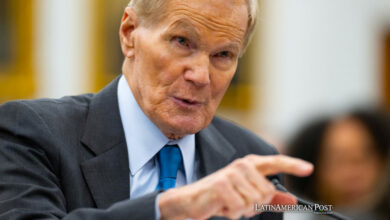TECHNOLOGY
-

Argentina Leads Groundbreaking Malbec Genome Research
In a pivotal scientific endeavor, researchers from Argentina, Spain, and Germany have successfully decoded the entire genome of the Malbec…
Read More » -

El Salvador Building Airport Hotel via Blockchain Technology
In a pioneering move, a private construction firm in El Salvador is set to issue $6.25 million in digital tokens…
Read More » -

Scientists Find Puerto Rico Water Contaminated by Coal Ash
Investigations reveal heavy metals and carcinogens in drinking water in southern Puerto Rico, raising urgent calls for removing coal ash…
Read More » -

NASA Seeks Space Collaboration on Mexican Visit
NASA's chief, Bill Nelson, is in Mexico City forging alliances to enhance space cooperation, marking a significant stride in bilateral…
Read More » -

Advancing Agri-Tech: Venezuela’s Strategic Seed Conservation Initiative
Venezuela's Ministry of Science and Technology spearheads an ambitious project to rescue, conserve, and multiply seeds with significant nutritional and…
Read More » -

eMerge Spotlights Latin American AI Innovation in Miami
This week, Miami hosts the tenth edition of eMerge America's technology and innovation forum, focusing on advancements in Artificial Intelligence…
Read More » -

Brazil Shines with 2 Million Solar-Powered Homes
Brazil hits a remarkable milestone with two million residences now harnessing the sun's power, generating 13 gigawatts from rooftop solar…
Read More » -

Argentina Upgrades Air Force with Danish F-16 Fighter Jets
Argentina's Defense Ministry has secured a $300 million deal to acquire 24 aging yet technologically refreshed F-16 fighter jets from…
Read More » -

Science Unlocks Arabica Genome Boosting Latin America’s Coffee Crop Resilience
Scientists have achieved a significant breakthrough by decoding the high-quality genome of the world's most popular coffee, Arabica, which promises…
Read More » -

Mexico to Harness Lithium for Electromobility
Claudia Sheinbaum, Mexico's ruling party presidential candidate, announces plans for a new technology developed by the Mexican Petroleum Institute to…
Read More »
